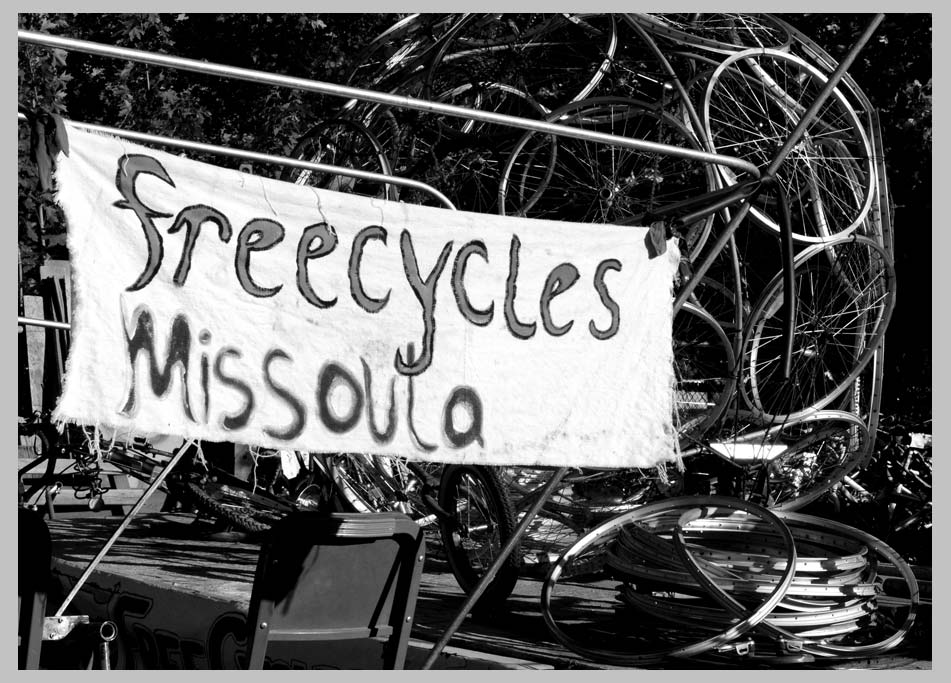

Freecycles Missoula, Montana (IX.27.2010) [ click photo for next . . . ]
Model bike-collective for Universe w/ 2 wheels!. . .
On the road in the American Northwest.


Freecycles Missoula, Montana (IX.27.2010) [ click photo for next . . . ]
Model bike-collective for Universe w/ 2 wheels!. . .
On the road in the American Northwest.
-
GO BIKES!
Bikes make an excellent model for a new, life-is-round
economy. Every part has a name, a number, a manufacturer,
and someone, somewhere, who knows how to fix or replace it!
Bikes are best sold and serviced by relatively small shops.
That’s because the shop serves an area where cyclists can
easily ride to have work done, or pick up new parts.
Bikes are the “slow food” of machines. Made to last; made to
establish strong face-to-face relationships between buyer and
seller; made to make the environment, as well as the user,
healthier the more they are used.
And bikes are cheap. An investment of $500 will last you a
lifetime. You don’t need a license; you don’t need insurance.
It’s said that the energy equivalent of 4 liters of gas (± a
gallon)—31,000 calories*—is enough Clifbars (± 133) to power
you 1000 k (600 m) down the road.
Now that’s math that’s got more than a bit of music to it!
* source: Scientific American Podcast:
host Steve Mirsky with Nick Goddard,
“The Gas Powered Bicycle” III.14.2007
Here are three more little Opera Buffa
pieces for the bike/philosophers among us:
THE FLAT-TIRE MODEL OF REALITY
20 miles out, 20 miles back.
Got a flat; That’s a fact.
Hard as nails, Life’s like that.
Gotta act—now; That’s a fact!
Excuses, excuses, excuses—
Why can’t I live like that? | pdf |
ROAD OF CHANGE
Down the rough road of change, a bike’s
wheel keeps its true by centering
in the clear intentions
of its motionless hub.
ROUGH ROAD AHEAD?
All passengers in a car running on a full tank
of fundamentalist religion, we’re tied up with
Freedom and Democracy in back. Money’s
in the driver’s seat, with Nation States,
spinning one against the other, for wheels.
“Hey,” somebody just yelled, “ Get out
at the next right!” | pdf |
ON CARS & CAR CULTURE—
a meditation
Along the way, on my treks by bike, I find in general that North Amer-
icans are good people. Honest, hard-working, always ready to help.
But put even a retired school teacher or grandmother behind
the wheel of a car, and instantly, before your very eyes, they will be
transformed into mean-spirited, blood-lusting hell-hounds, more than
willing to run their own children off the street.
Yet because we can evidently only perceive this deep division of
North America’s psyche by stepping resolutely out of our vehicles,
I fear we loyal citizens of Car Culture will be unable to
see the state into which we have driven ourselves. That is:—
until the world’s gas tank hits empty.
Addiction to oil? The analogy is a poor one. The addict always
has a certain awareness that what he or she is doing is wrong,
This awareness leads to guilt.
To get behind the wheel of a car, however, is to turn the key on a very
much more powerful illusion; it is a kind of all-self-enveloping worldview,
one which can only be sustained as long as there is a complete and
total denial of its false and contradictory nature. And worldviews, un-
like the highs of drugs, do not wear off. Consider how the philosophy
of fascism blinded the Germans and Italians—two of the very greatest
and most creative of European cultures—into seeing themselves as
essentially heroic protagonists acting out a Reinzi-like drama of Good
vs. Evil.
In a similar way, from inside the car, we are blinded by the comforting
sense of mechanical power, a power which gives us the idea that all is
peace, order, and tranquility. From outside the car, however, in truth,
at least in my view, all is in reality fragmentation, disorder, and destruction.
As the final scene of this tragic opera rapidly closes in on us, so the
illusions generated by Car Culture will come to an end, whether we like
it or not. To my mind, the urgent question is: will this happen in a calm,
rational and creative way, as well it should if only our ways of
thinking about energy might reach the same level of sophistication
of our information technology?
Or will we instead, like the National Socialists before us, drive our
illusion straight into the inferno we call “the pleasures of the open road?”
| download mp3 ON CARS & CAR CULTURE 7 Mb] |
HERE
On the way,
many beautiful camps
offer themselves for the night.
But to know,
when to keep walking and
when to stay,
and, after stopping,
to know without a doubt
that this place, where one stands,
here,
I am at home.
Hummingbird Pass,
Eagle Cap Wilderness,
Oregon, X.29.2008
ON CARS & CAR CULTURE and HERE are part of
THE LITTLE CLAVIER please preview 150 of 631 pages
w/ my black & white photography [opens in new window]
Let me know what you think!
Featured gallery, mountain water . . . .Please visit my MOUNTAIN Water Gallery—some of
the best of my flowform photography w/ a selection of the highest quality
prints & frames . . . [ mouse over for controls / lower right fro full-screen ]
All Photographs & texts by Cliff Crego © 1999-2015 picture-poems.com
(created: III.25.2011)